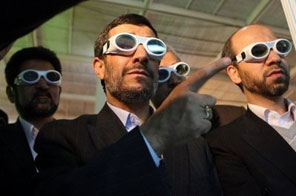Iran to inform IAEA of higher uranium enrichment plan
TEHRAN: Iran was expected Monday to officially inform the UN nuclear watchdog of its plans to enrich uranium to a higher level, but insisted it will stop the process if a UN-backed nuclear deal is clinched.
Iran's atomic chief Ali Akbar Salehi announced that Tehran will begin enriching uranium to 20 percent from Tuesday and that the International Atomic Energy Agency (IAEA) would be informed of its decision on Monday.
Western nations, which fear Tehran's civilian nuclear programme masks plans to build a bomb, have renewed calls for tighter sanctions on Iran.
Salehi's announcement late Sunday came just hours after he was ordered by Iran's hardline president Mahmoud Ahmadinejad to start enriching uranium to 20 percent to provide nuclear fuel to the Tehran reactor.
"We will inform the IAEA in a letter tomorrow (Monday) of our intention to enrich uranium to 20 percent," Ali Akbar Salehi told the Arabic-language Al-Alam television on Sunday.
"The higher enrichment will begin at the Natanz plant from the day after tomorrow (Tuesday)," he added.
Iran's main uranium enrichment facility is in the central city of Natanz where it has carried on the sensitive atomic work defiantly for years despite three rounds of UN sanctions.
Salehi, however, said that Tehran would stop the higher enrichment programme if a long-negotiated deal with world powers is concluded.
The UN-drafted deal envisages shipping out Iran's low-enriched uranium (LEU) of 3.5 percent abroad to be converted into 20 percent enriched uranium for Tehran's research reactor, which makes medical isotopes.
"Our proposal (to swap the LEU with the fuel) is valid but if we receive the fuel then we will stop the enrichment" of 20 percent uranium, Salehi said, leaving the door open for a last minute deal.
Iran's decision to enrich uranium to a higher level has raised the stakes in Tehran's dispute with the West over its nuclear programme and drew immediate condemnation from Britain and the United States.
"Reports that Iran is planning to enrich some of their fuel to 20 percent level of enrichment are clearly a matter of serious concern," a spokeswoman for the foreign office said in London.
US Defence Secretary Robert Gates called for mounting "international pressure" on Iran.
"The international community has offered the Iranian government multiple opportunities to provide reassurance of its intentions. The results have been very disappointing," Gates said in Rome.
Iran insists the swap of uranium take place gradually inside the country, an option opposed by world powers who want the Islamic republic's LEU sent abroad to allay their fears that Tehran's ultimate goal is to produce atomic weapons.
Iran insists that its nuclear enrichment drive is purely peaceful.
Ahmadinejad on Sunday blamed world powers for the stalemate over the stalled deal.
"I had said let us give them (world powers) two to three months and if they don't agree, we would start ourselves," he said.
"Now Dr Salehi, start to make the 20 percent with the centrifuges," he told the atomic chief who was in the audience.
Ahmadinejad insisted on Sunday that world powers "unconditionally" accept exchanging Iran's LEU for high purity 20 percent enriched uranium.
His statement came after he indicated in an interview on state television last Tuesday that Iran was ready to send its LEU abroad for conversion into 20 percent nuclear fuel.
Gates is scheduled to meet French President Nicolas Sarkozy in Paris on Monday where the two could possibly discuss Tehran's latest stance.






